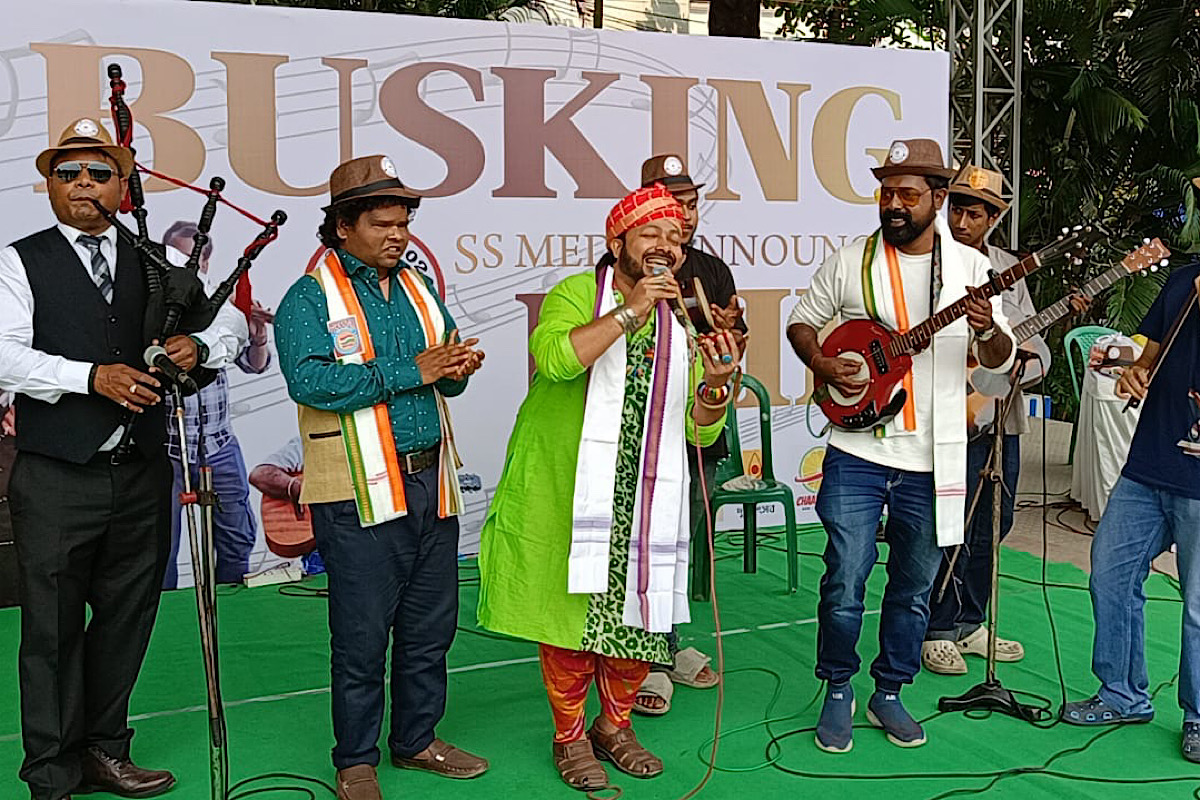Busking may not be new in India, but it hasn’t achieved as much popularity as it has abroad. There are artistes, who do it for a living, and some do it out of love. For music-loving Kolkata, the art is steadily gaining an audience and artistes too.
The Cambridge dictionary defines it as “to play music or sing in a public place so that the people who are there will give money.”
Advertisement
Kolkata has a fair share of its busking community, who entertain people at favourite city jaunts like Park Street, Outram Ghat, Babu Ghat, Princep Ghat, City Centre-I and II, Dhakuria Lake, etc.
Twenty-seven-year-old Saikat Sardar, who plays flute, says he was drawn to it, inspired by friends who are into it. He also does group shows and plays with bands at concerts to sustain himself.
Someone who plays in Park Street and Newtown, says it is very fulfilling and feels it has a great future in India. “This is an art that also encourages artistes to better their performances, which will ultimately benefit the music industry,” says the Belghoria resident. “I have played on local trains with my friends, and people appreciate our music. They crowd around us, and music touches them all. Many times, we were offered money too by fellow passengers,” adds Saikat.
Singer and rhythmist Krishnendu Banerjee is mindful of the place where he is busking and chooses songs based on the nuance of that place. “We play Bengali and Hindi songs starting from the 1960s to the 2010s in front of the Dhakuria Lake, New Market, Park Street., or Salt Lake. I have a group called Third Stage with my friend Sourojyoti, who plays the violin. We also choose themes for occasions like 25 December or 25th of Baisakh,” says Krishnendu, adding, “If we are in the Lake area, we do songs of SD Burman or Rupam Islam. In south Kolkata, Anupam Roy’s songs are more accepted. Likewise, if we are in the Dum Dum area, people like to listen to Nachiketa.”
The BMus graduate from Calcutta University says every street has its own voice. He narrates an incident: “We were playing in the Lake area when two college students offered us some money (a small token). On their request, I played my own compositions, which greatly charmed them, and they offered another Rs 200.”
For Rishab Ghosh, keyboardist and guitarist, busking is also about connecting with people.
Rishab’s job as a food delivery boy and a bike ride service driver frequently brought him to Park Street. After seeing a man busking and earning money from it, he too tried his luck, and it clicked. The son of ghazal singers, music is in Rishab’s blood.
The 25-year-old also met Rupam Islam on the streets while busking. “Rupam Da had seen my social media post and commented that he would bump into me in Park Street. One day, while I was playing his songs, his wife, Rupsha Dasgupta, filmed me, and a little later, I saw my idol in front of me. He gave me Rs 500, which I have preserved. Busking also led me to meet Somlata Acharyya Chowdhury, and she too liked my work,” says Rishab.
On the streets, Rishab says he not only has to keep the audience engaged but also promote himself. “Around 90 per cent of the people on the streets do not stay to appreciate the music, but they lisp. And the appreciation of the remaining 10 per cent makes me happy,” he adds.
Krishnendu Bhunia, a song writer and busking promoter, works with artists who are poor on online platforms.
The man from Sabong, Midnapore, says he has travelled throughout the state to pick talent. “More than 1,100 artists have recorded for my label, covering 5,500 villages. I have recorded for physically challenged artistes too, including 17 visually challenged ones. These artistes have had no formal training, but with sheer talent, they have become folk devotional singers. There are Samiran Das, Sucharita Saha and Shariful Islam Baul, who have many hits against their names,” says the music promoter.
Krishnendu works at a multinational firm and runs 16 YouTube channels. He has also acted in a couple of films, one of them with senior actor Victor Banerjee.
For West Bengal Police personnel Ramesh Nayak, busking is a passion, and he works hard to hone his skills. He admits that juggling work, playing a bagpipe on the streets, and practising in free hours is tough.
Ramesh says he took up playing the bagpipe for the police band by accident but then fell in love with it. “I want to take Scottish music to the people and make it more accessible. It is a very hard instrument to play and needs physical endurance,” he remarks.
Ramesh recently imported a bagpipe from Scotland, which cost him around Rs 1.5 lakh. He now plans to invest in a smaller version of the instrument. He says he was always drawn to Celtic music, especially after watching Titanic.
“Busking is very good for youngsters to gain experience. This way, you can also earn. I save the money I get from busking and have plans to use it to teach youngsters who are interested in it. I want more bagpipe buskers on the streets,” says the bagpiper, who has been offered to collaborate with composer Debajyoti Mishra.











